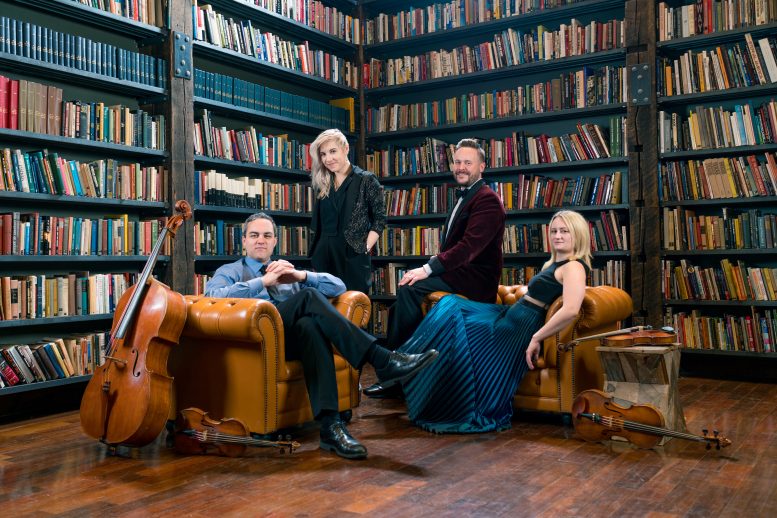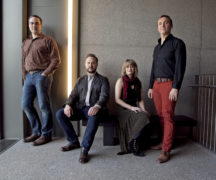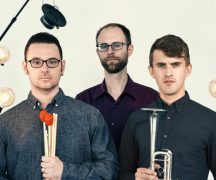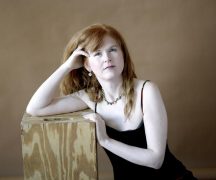By DAVID DUPONT
BG Independent News
The Spektral Quartet was last on the BGSU campus five years, three Grammy Award nominations, and one new violinist ago.
Doyle Armbrust, the string quartet’s violist, said the Grammy nods reflect that “we’re at a slightly more elevated point in our career.”
That the nominations were for best classical chamber recording, best Latin jazz, and best World music albums is testament to the Spektral Quartet’s ever expanding range.
The quartet is known for its juxtaposing of contemporary string quartets with the classics. So on their 2020 release “Experiments in Living,” they open with Johannes Brahms String Quartet in C minor completed in 1873 and end with George Lewis’ 2016 “String Quartet 1.5: Experiments in Living.” And the album comes with a set of Tarot cards that encourages the listener to create a new path through the music.
The Spektral Quartet – Clara Lyon and Maeve Feinberg, violin, Armbrust, viola, and Russell Rolen, cello – will return to Bowling Green State University, virtually at least, this weekend as the guest of the Music at the Forefront Series. The ensemble will perform Monday, April 12 at 8 p.m. via live stream and present a New Music Help Desk question and answer session with students and the community Friday, April 9 at 4 p.m.
Feinberg joined the group four years ago, and as with any change in a small ensemble that brings a shift in personality.
Also, Spektral has engaged an agency, Alliance Artists, and that opened up doors for touring, Armbruster said.
Though the ensemble may be going places in its career, they remain rooted in Chicago.
That’s evident in the program they’ll perform during their BGSU residency. The program will be dominated by composers who have lived in Chicago.
Armbrust likened the concert to “a postcard from Chicago.” It also serves as “mini-retrospective” of the quartet’s decade-long history.
The program includes a movement from Eliza Brown’s String Quartet No. 1. It’s a piece the quartet has been playing for their entire history. In their notes, the quartet states: “Brown’s hyper-elongated chord progression in her String Quartet No. 1 remains one of the group’s most-cherished and most-played numbers.”
Armbrust said, after 10 years “we’re fascinated by it, which is saying something.”
Two cross-genre explorations are included – Katherine Young’s humorous reimagining of Arthur Russell’s “Hiding Your Present From You” and jazz pianist and chamber music composer Gene Knific’s exploration of Sufjan Stevens’ “Arnika.” Then there’s cellist-composer Tomeka Reid’s 2016 piece “Prospective Dwellers,” which was composed as she was interviewing residents in Chicago’s Dorchester Projects.
The exception to the Chicago-theme is the opener, a movement from Anna Thorvaldsdottir’s “Enigma.” The piece is one of the large-scale projects the quartet is focused on. Slated for release later this year, “Enigma” was composed to be performed in planetarium dome theaters, though the music stands on its own. That’s the form the excerpt will take in the BGSU concert.
The quartet has always played movements and excerpts from pieces, and that seems all the more appropriate in a time of virtual performances, Armbrust said.
Beyond the thematic threads, he said, “we just wanted to take music that’s exciting to an audience watching online. … Sitting and watching a screen is a different experience.”
As the pandemic put live concerts on hold, the quartet decided “to lean into the interactivity of our concerts,” Armbrust said. “That’s part of the personality of the group.” Just sitting in place and performing does not cut it when the audience is remote.
So they perform shorter pieces and talk more about them, Armbrust said.
The New Music Help Desk also keeps them interacting with the audience, fellow musicians, composers, and students. Participants can ask technical questions about notation or broach larger concerns about society and politics.
The members of the quartet will also be talking to students about being “citizen artists.”
“We are really trying to become part of the fabric here in Chicago,” Armbrust said. They’ve made progress in that direction in the past five years, including working with artist activist Theaster Gates and the Rebuild Foundation.
In their talk they emphasize that community outreach should not just be a box checked off on a grant application. “It should be fully integrated into what you are,” he said.
“The early version of this talk came from a place of remembering our own schooling.” There was a three-prong career track. A student could head off to be a soloist or an orchestra member or a teacher. “I think a lot of that still persists,” he said, especially in conservatories, though not at a “progressive” school such as Bowling Green.
“We’re trying to make a fulfilling career, instead of one of just making ends meet.”
That goes into the programming of every concert whether it’s a pop-up show at a coffee house or a performance in a concert hall.
They want to music to be not just accessible “but enticing to people who might ordinarily not feel like that is their scene.”
The quartet is looking forward to the BGSU residency. “The audience there is unlike anywhere else. Everyone is so open to different styles and approaches to music that we feel a lot of freedom when it comes programming. It’s different than other places we play,” he said.
“We’re really excited to be back working with Kurt,” he said in reference to Kurt Doles, the executive director of the MidAmerican Center for Contemporary Music. The center hosts the Music at the Forefront concert series and the annual New Music Festival, for which Spektral was the guest ensemble for in 2016.
“It’s a really special place,” he said. “It has a lot of meaning for us .”
Spektral’s performances at BGSU have been among the quartet’s “most memorable.”
“It’s a special group of people. As we’re all scratching our way back towards something normal, even if concert is virtual, we’re very excited to be communicating with and interacting with everybody there. Hopefully, we’ll be back on campus at some point after that.”





